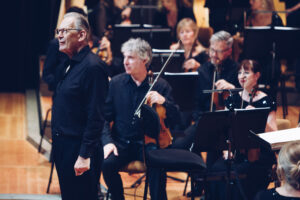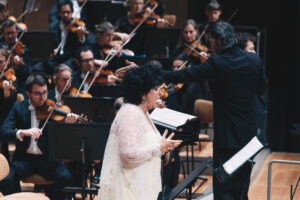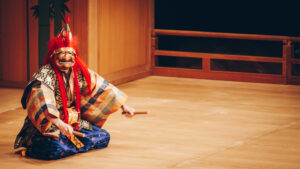It’s been nearly twenty years since the autumn review of cultural highlights, organised under the aegis of Berliner Festspiele, grew so much that it had to be divided into several separate strands. The new music festival, under a working name of Konzerte/Oper, was launched in 2004, still in the HBF building, which hosted the concerts, alternating as the festival venue with the chamber hall of the Philhamonie. One year later the event acquired its current name, Musikfest Berlin. In 2006 it underwent another metamorphosis: into a three-week marathon organised in close collaboration with the Berlin Philharmonic Foundation and focused primarily on orchestral music. The man appointed new director of the festival was Winrich Hopp – historian of philosophy, musicologist specialising in Stockhausen’s oeuvre, member of the Nordrhein-Westfälischen Akademie der Wissenschaften und der Künste, since 2011 also in charge of the Munich cycle Musica Viva, organised under the auspices of Bayerischer Rundfunk.
From the very beginning Hopp did not hide his fascination with the orchestra, alongside theatre and opera – and then also cinema – one of the most powerful and most complex “cultural machineries” of the modern West. The programmes of the Berlin festivals are still constructed in defiance of the Philharmonie regulars, but the director strives to keep up with the tendencies to be found on the world music scene. He moves the boundaries very carefully in order not to put off “ordinary” music lovers. This year he focused on, among others, the anniversary of Berlioz’s death, and among ensembles traditionally invited to the Musikfest from outside Berlin he evidently favoured British orchestras – with a clear intention of stressing that the musical heritage of the United Kingdom had been an integral part of European culture and could not be squandered in the brouhaha surrounding Brexit. Both these strands were harmoniously combined in the inaugural evening featuring Benvenuto Cellini performed by the soloists, Monteverdi Choir and Orchestre Révolutionnaire et Romantique conducted by John Eliot Gardiner. I could not have missed such a treat and as it was followed by a few other operatic-theatrical rarities, I decided to stay in Berlin a little longer.
John Eliot Gardiner and his Orchestre Révolutionnaire et Romantique. Photo: Adam Janisch
Berlioz’s first opera has not had an easy life on stage. The libretto by Léon de Wailly and Auguste Barbier, initially written for an opéra comique, was rejected on the spot by the company based in Paris’ Salle Favart. After removing the spoken dialogues and making numerous corrections that were to make the text more coherent dramatically, the librettists transformed Benvenuto Cellini into an opéra semi-sérieux and submitted it for approval to Henri Duponchel, the then director of the Paris Opera. One year later, in 1836, Berlioz began composing. The censors intervened already during rehearsals, demanding that Pope Clement VII be replaced with Cardinal Salviati (although both Salviati brothers were made cardinals long after the period in which the action of the opera takes place, this must have been regarded as a mere trifle given the general inconsistency of the libretto). The premiere in September 1838 was a fiasco – despite the fact that the title role was sung by the famous Gilbert Duprez and the conductor was no less a figure than François Habeneck. The work – brimming with melodic invention and original orchestration ideas like the goldsmith’s crucible in Act II – was greeted by the audience with hissing and general commotion. In 1852, on Liszt’s initiative and after a thorough revision of the score by the composer, Cellini was staged in Weimar – without much success, just as in London some time later. Interest in this masterpiece began to rise gradually, although still tentatively, more or less half a century ago. Benvenuto Cellini returned to the stage of Covent Garden in 1966 – together with the now uncensored Pope Clement. Perhaps the opera would have been completely forgotten, if it had not been for the overture, performed as a stand-alone piece, and Le carnaval romain, a work composed six years later in which Berlioz used some material from Act I.
Two years after the famous tour with three Monteverdi operas Gardiner returned to the Philharmonie in better form than ever. The huge orchestra – with an expanded percussion section, four harps, four bassoons, two guitars, cor anglais and ophicleide, included in the source text – wowed the listeners with the richness of its colours and abruptness of rhythmic changes from the very first bars of the overture. Every ensemble, every chorus scene heralded the future greatness of Les Troyens. In all respects and in the best sense of the word, the music of Benvenuto Cellini turned out to be “excessive”: glittering, brimming with energy, striking with its typically Berliozian harmonic turns, especially in the truly revolutionary and romantic take by the British musicians presenting a version edited by Gardiner himself.
Yet all their efforts would have been in vain, if it had not been for the sensational cast. Michael Spyres shone like a jewel as Cellini. He is a truly “French” heroic tenor with an incredibly wide range, boasting an almost baritonal bottom register and a light, very resonant top. His ardour in “Ma dague en main” and dazzling lyricism in “Sur les monts les plus sauvages” in Act II were something Duprez himself could have envied – after all, he essentially failed in his take on the fiendishly difficult part of the Florentine goldsmith and withdrew already from the third performance after the premiere. It would be hard to decide which of the female voices deserved the highest praise: the passionate and very musical Sophia Burgos in the soprano role of Teresa or the velvety-voiced and beautifully phrasing mezzo-soprano Adèle Charvet in the trouser role of Ascanio – all the more so that both singers were impressive in their perfect mutual understanding in the inspired duet “Rosa purpurea”. The Belgian baritone Lionel Lhote as the jealous Fieramosca demonstrated not only his acting skills but also phenomenal technique. The same could be said of Tareq Nazmi, a highly cultured singer with a beautiful bass voice, who was brilliant as the pretentious pope, clearly confused by the sudden move from carnival to Lent. In fact, each role was a gem – and as there were many of them, let me just mention the splendid and very stylish Maurizio Muraro, who at the last minute stepped in for Matthew Rose in the demanding part of Balducci.
Huge praise should also go to the creative team, headed by the Israeli Noa Naamat, Jette Parker Young Artist at Covent Garden. I cannot imagine a better school for talented young opera directors than working with Gardiner, who demands from the creative teams of his staged concerts at least as much precision and care as from his musicians. Naamat entrusted complex but at the same time logical acting tasks not just to soloists and every member of the chorus, but also to individual orchestral musicians and… the conductor himself. Instead of heavy antics on the proscenium we saw a lively, witty performance – in simple but clear costumes (Sarah Denise Cordery) and lighting (Rick Fisher) that aptly highlighted the narrative. This production of Benvenuto Cellini went straight from Berlin to the Proms and then to the Royal Opera of Versailles. I did not think I would see the day when semi-staged evenings would bring me more joy than “true” opera performances.
Die Frau ohne Schatten. Ildikó Komlósi (Nurse). Photo: Monika Karczmarczyk
Completely different emotions were generated by a concert performance of Die Frau ohne Schatten by the Rundfunkchor, Staatsoper’s children’s chorus, RSB orchestra and a large group of soloists conducted by Vladimir Jurowski. This time the loudest applause was earned by the various ensembles and the conductor. As I have already written elsewhere, Richard Strauss’ beloved operatic child of woe, to which he fondly referred using the acronym “Frosch” (“Frog”), deserves the title of the most convoluted narrative in the history of the composer’s collaboration with Hugo von Hofmannsthal. It has literally everything, from loose inspiration by Wilhelm Hauff’s fairy tale Das kalte Herz and fragments of Goethe’s The Conversations of German Refugees, through references to his other works, including Wilhelm Meister, part two of Faust and Der Zauberflöte zweyter Theil, to One Thousand and One Nights and the Grimm brothers’ Fairy Tales. And all this can be heard in the music, as erudite as it is ethereally beautiful. In order to cope with the demands of this masterpiece, we need an experienced and very imaginative kapellmeister, disciplined choirs, very capable orchestra and at least six outstanding soloists.
Unfortunately, the most important among the protagonists: the Emperor, the Empress and (to a lesser extent) the Nurse were disappointing. Anne Schwanewilms never commanded a beautiful soprano voice – as years went by, the ugly timbre began to be compounded by problems with voice production, “thinning” of the middle register and shrill top notes, particularly difficult to endure in Act III, when the singing has to cut through a very dense orchestral texture. Torsten Kerl sang his role merely correctly and with no imagination – what is worse, he wavered at “Falke, Falke, die Wiedergefundener”, destroying one of the most magical moments in the history of opera. Ildikó Komlósi’s mezzo-soprano had betrayed signs of serious wear and tear already two years before in Bluebeard’s Castle in Katowice – but like then, this time, too, the singer masked an imprecise intonation and uncontrolled vibrato by excellent phrasing and brilliant acting. Judging by the audience’s reaction – quite effectively.
In such a situation – paradoxically – beautiful voices and subtle interpretation were to be found in “ordinary” characters of the Dyer’s Wife (superb Ricarda Merbeth) and Barak (even better Thomas J. Mayer), not to mention the finely sung roles of the One-Eyed Man, the One-Armed Man and the Hunchback (Jens Larsen, Christian Oldenburg and Tom Erik Lie). Another memorable performance came from Yasushi Hirano (Messenger of Keikobad), a full sounding baritone with an excellent lower register. The performances of the other soloists varied. I also have to admit that I doubts about casting a countertenor to sing the Guardian of the Threshold – even if his voice is as ringing and well-placed as Andrey Nemzer’s.
To put together a good cast for Die Frau ohne Schatten verges on the impossible, so perhaps I should not complain, although in my opinion more courageous casting choices would not have been amiss. Fortunately, Strauss’ work resembles at times a very complex symphonic poem, which Jurowski conducted with incredible panache, using surprisingly sharp tempi, with the intricate orchestral texture pulsating with a lively rhythm of two interpenetrating worlds – the land of human beings and the tonally unstable sphere of fairy tale creatures. The reactions of the Berlin audience were beyond belief – the listeners followed the complex narrative perched on the edge of their seats, accompanied the soloists singing along voicelessly and at the end exploded in rapturous applause. Strauss’ Sorgenkind finally grew to become a beautiful swan.
I have devoted more room to operatic events from the first few days of the Musikfest, which does not mean that there was nothing to enthuse about during a recital by Alexander Melnikov, who presented a programme of Rossini’s charming ditties and Berlioz’s Symphonie fantastique in Liszt’s transcription, playing a finely restored concert Érard from the 1880s. The Russian pianist impresses with his musicality and plays with a very light hand, “above” the keyboard, as it were, which irritates the purists, but which most listeners, including myself, find absolutely inoffensive. His wonderful ability to shape musical landscapes more than made up for a few missed notes.
What proved to be a rather nice surprise was an evening with one of my favourite orchestras (Concertgebouw) under one of my least favourite conductors (Tugan Sokhiev). It turned out that in a programme featuring a composition well known to the musicians (German premiere of Andriessen’s Mysteriën) and a piece quite close to the kapellmeister (Tchaikovsky’s Symphony No. 1) Sokhiev was much better than Daniele Gatti, who two years before, conducting the same orchestra, horribly massacred Bruckner’s Ninth. On top of that Sokhiev was amazingly good in the encore, an excerpt from Prokofiev’s Symphony No. 1. Another proof that one has to fight one’s prejudices.
Okutsu Kentarō as the Thunder God in Kaminari. Photo: Adam Janisch
As a farewell to Muskfest I treated myself to an evening with the Japanese Nō theatre by the Tokyo company Umewaka Kennōkai led by Manzaburō Umewaka III called Makio – representing the fourteenth generation of a family of actors continuing the tradition of the Kanze school, founded in the 14th century by Master Kan’ami Kiyotsugu. The artists presented three plays: The Ghost of the Rice Wine (Shōjō – Midare/Sō no mai), a ceremonial dance show with elements of the kyōgen farce; The Thunder God (Kaminari), or a comic kyōgen intermezzo; and The Deadweight of Love (Koi no Omoni) – one of the most famous works by Motokiyo Zeami, 14th-century playwright and Nō theorist – featuring Makio himself as the spirit of a dead gardener, who fell unhappily in love with a lady-in-waiting and was cruelly humiliated by her. I have always been fascinated by Nō theatre as “sung” drama – in the characteristic septuple metre of classical Japanese poetry, with a chorus and four-member instrumental ensemble, hayashi, comprising three percussionists and a musician playing the nokhan flute. However, its most intriguing element is the invariability of the convention, cultivated for nearly six hundred years – which naturally encourages comparisons with the convention of European opera, frequently said to be doomed, which for young spectators with no links to the tradition may prove as hermetic as the plays by Kan’ami and Zeami.
I last talked to Winrich Hopp six years ago, when Musikfest focused on the oeuvre of Lutosławski and Britten. He told at the time that he believed both in the young and in tradition. That no matter what happened to music, he would accompany it. It is nice to see that there are still people who can keep their promises.
Translated by: Anna Kijak



